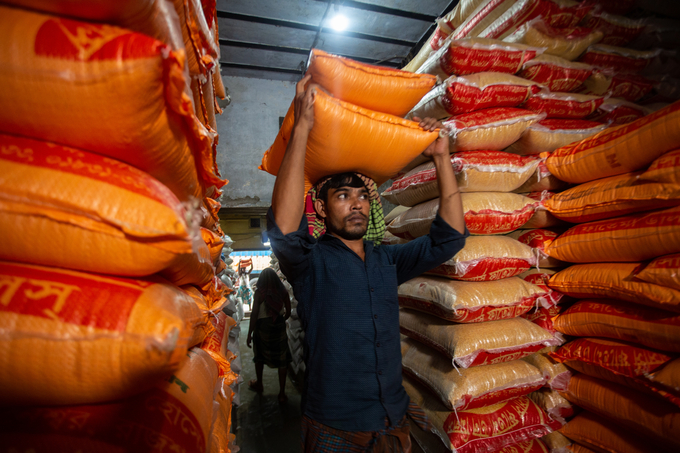June 17, 2025 | 02:57 GMT +7
June 17, 2025 | 02:57 GMT +7
Hotline: 0913.378.918
June 17, 2025 | 02:57 GMT +7
Hotline: 0913.378.918

Loading rice in Bangladesh.
The benchmark index of international food commodity prices declined in January for the tenth consecutive month, the Food and Agriculture Organization of the United Nations reported Friday.
The FAO Food Price Index averaged 131.2 points in January, 0.8 percent lower than the previous month and 17.9 percent below its peak reached in March 2022. The index tracks monthly changes in the international prices of commonly-traded food commodities. The price indices for vegetable oils, dairy and sugar drove the January decline, while those for cereals and meat remained largely stable.
In January, the FAO Cereal Price Index was essentially unchanged (up a mere 0.1 percent) from December and stood 4.8 percent above its level of one year earlier. International wheat prices declined by 2.5 percent as production in Australia and the Russian Federation outpaced expectations. World maize prices rose marginally due to strong demand for exports from Brazil and concerns over dry conditions in Argentina. International rice prices, however, jumped by 6.2 percent from December, influenced by tighter availabilities, strong local demand in some Asian exporting countries and exchange rate movements.
The FAO Vegetable Oil Price Index declined by 2.9 percent in January. World prices of palm and soy oils dropped amid subdued global import demand, while those of sunflowerseed and rapeseed oils declined due to ample export availabilities.
The FAO Dairy Price Index averaged 1.4 percent lower than in December, with prices trending down for butter and milk powders on lighter demand from leading importers and increased supplies from New Zealand. World cheese prices rose slightly, driven by a recovery in food services and retail sales in Western Europe following the New Year holiday, as well as currency movements.
The FAO Meat Price Index moved fractionally in January (edging down just 0.1 percent from December), as ample export availabilities weighed on poultry, pig and bovine meat prices , while ovine export prices rose due to stronger import demand.
The FAO Sugar Price Index dropped by 1.1 percent from December. Strong harvest progress in Thailand and favourable weather conditions in Brazil outweighed the impact on prices due to concerns over lower crop yields in India, higher gasoline prices in Brazil, which support demand for ethanol, as well as the Brazilian real’s appreciation against the United States dollar.
More details and data available here.
Cereal supply still seen tightening in 2022/23
In its new Cereal Supply and Demand Brief, also released Friday, FAO raised its forecast for world cereal production in 2022; however, global cereal supplies are still forecast to tighten in 2022/23.
Global cereal output in 2022 is now forecast at 2 765 million tonnes, or 1.7 percent below the 2021 outturn. Upward revisions for Australia and the Russian Federation now point to a record global output for wheat in 2022, while total coarse grains production is expected to decline by 3.3 percent from the previous year. The forecast for world rice production was revised downward as lower-than-expected output in China more than offset upward revisions for Bangladesh and several other countries. As a result, global rice output is now predicted to decline by 2.6 percent from its all-time high in 2021.
Looking ahead to 2023, early indications point to likely area expansions for winter wheat cropping in the northern hemisphere, especially in the United States of America, driven mostly by elevated wheat prices. However, high fertilizer costs may affect application rates with adverse implications for yields.
Low domestic prices could result in a small cutback in wheat plantings in the Russian Federation, the world’s largest exporter, while severe war-induced impacts in Ukraine are estimated to reduce winter wheat area plantings by 40 percent. Record plantings are forecast in India, spurred by high market and support prices, and relatively high plantings are projected in Pakistan as standing water from the 2022 floods is causing less hindrance than initially anticipated.
In the southern hemisphere countries, most of the 2023 coarse grain crops have been sown. Brazil may post record maize plantings, while those in Argentina could decrease due to low soil moisture levels. Weather conditions augur well for maize yield prospects in South Africa.
World cereal utilization in 2022/23 is now forecast to drop by 0.7 percent from the previous year, to amount to 2 779 million tonnes, with the total utilization of maize predicted to decline, while wheat use increases and rice utilization changes little year-on-year.
The forecast for world cereal stocks is pegged at 844 million tonnes at the end of the marketing year, pushing down the world stock-to-use ratio for 2022/2 to 29.5 percent.
In its new brief, FAO predicts international trade in cereals in 2022/23 to decline by 1.7 percent from the previous year’s record level to 474 million tonnes.
(FAO.org)

(VAN) Extensive licensing requirements raise concerns about intellectual property theft.

(VAN) As of Friday, a salmonella outbreak linked to a California egg producer had sickened at least 79 people. Of the infected people, 21 hospitalizations were reported, U.S. health officials said.

(VAN) With the war ongoing, many Ukrainian farmers and rural farming families face limited access to their land due to mines and lack the financial resources to purchase needed agricultural inputs.

(VAN) Vikas Rambal has quietly built a $5 billion business empire in manufacturing, property and solar, and catapulted onto the Rich List.

(VAN) Available cropland now at less than five percent, according to latest geospatial assessment from FAO and UNOSAT.

(VAN) Alt Carbon has raised $12 million in a seed round as it plans to scale its carbon dioxide removal work in the South Asian nation.

(VAN) Attempts to bring down the price of the Japanese staple have had little effect amid a cost-of-living crisis.